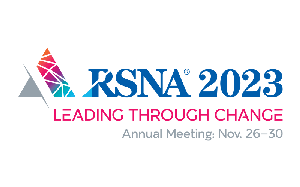RSNA 2023 Highlights Topics Captivating Attention in Radiology
This year's scientific content includes several topics receiving "buzz" in the specialty
October 30, 2023

RSNA 2023 will offer scientific sessions and educational exhibits that showcase cutting-edge breakthroughs in radiology and address the challenges of pressing health care issues. You have an unparalleled opportunity to delve into these hot topics that are generating excitement throughout the specialty and are contributing to the future of medicine. Look for these topics throughout the program and consider the following sessions:
Sustainability
- Energy Stewardship in MRI
- One Small Change for Your Practice, One Giant Leap for Environmental Sustainability
- Exposing Sustainable Imaging Strategies: The Role of Practitioners in Reducing Carbon Footprint
Equity
- Assessing Role of Patient Social Factors on Radiology Cancellations and No-Shows
- Decolonizing Radiology: Addressing Historical Influences and Promoting Global Equity
- Emergency Radiology Practice Management in 2023: Health Equity, Sustainability and Cost in the U.S. and Europe
Theranostics
- Design and Creation of a 3D Printed Realistic Anthropomorphic Kidney Phantom for Theranostics (Lutetium-177) Dosimetry
- LAMP-1 Targeted PET Imaging for Detection of Adenocarcinomas
- Assessment of Oxygen Saturation in Breast Tumors Using Photoacoustic Imaging: Correlation with Benign and Malignant Disease
Imaging of Immunotherapy
- Multiparametric Magnetic Resonance Assessment of Tumor Response to Neoadjuvant Immunotherapy in Muscle-invasive Bladder Cancer
- Radiomics Derived Phenotypes Predict Response to Durvalumab Immunotherapy for Non-Small Cell Lung Cancer
- Combined Y90 Radioembolization and Immunotherapy for the Treatment of Hepatocellular Carcinoma. Is it effective or harmful due to adverse effects?
Generative AI
- GPT Language Models for Automated Synoptic Reporting and Determination of Resectability in Pancreatic Cancer
- Exploring Racial Disparities in Imaging Datasets via Generative AI: A Path to Enhanced Model Transparency
- Utilizing Large Language Models for Neuro-Oncologic Prediction: A Multi-Center Study on Magnetic Resonance Imaging Reports